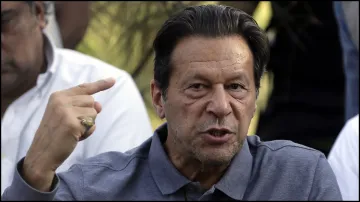Pakistan's ex-PM Imran Khan 'open to dialogue' amid battered hopes of contesting elections
Imran Khan has faced several setbacks in the run-up to the elections, as his party has lost its 'bat' electoral symbol. On the top of that, the former PM is almost out of all options to contest the elections after the Lahore HC rejected his plea against rejection of nomination papers.

Pakistan elections: Pakistan's imprisoned former Prime Minister Imran Khan on Friday hinted that he remained open to talks with other parties ahead of the February 8 elections, after the Pakistan Tehreek-e-Insaf (PTI) founder is almost out of all options for a chance of returning to power. Despite this, Imran emphasised that the PTI would prefer to join the opposition rather than form a "weak government", Dawn reported.
Talking to mediapersons during the hearings of Toshakhana and another graft case at Adiala Jail, Imran claimed that his previous government was under the sway of former army chief retired Gen Qamar Javed Bajwa due to PTI’s slim parliamentary majority in the parliament. However, he exuded confidence that PTI would secure a sweeping victory in the upcoming polls with the support of 90 per cent of armed forces personnel.
On the possibility of dialogue with political parties, the former PM said a politician is “always ready to hold dialogues”, citing his attempts to de-escalate tensions with Iran during his tenure. He used the term khalai makhlooq (celestial beings) to criticise the Pakistan military's alleged attempts to interfere in national politics.
“We had been weakened by design (so that they) get hold of the government,” he said, alleging that the party was a victim of rigging. He also recalled Bajwa's initial cordial behaviour after the 2018 election, claiming that the former army chief later “started controlling us”.
The former premier said the country’s economy could be revived only through a stable government, stressing that the recently formed Special Investment Facilitation Council (SIFC) could not bring investment without political stability. Speaking about the cipher case, in which he was indicted with his deputy Shah Mahmood Qureshi, Imran claimed that the document was still with Pakistan's Foreign Ministry and he received a rephrased version of the diplomatic cable.
Imran also lashed out against the Pakistan Muslim League-Nawaz (PML-N) for “befooling people” after “crippling the economy” during their 16 months in power. While referring to the prevailing political landscape in the country, Khan said that steps were being taken to form a "controlled parliament".
Imran Khan's growing woes
The PTI founder has been facing consecutive setbacks in the lead up to the general elections. Imran was jailed in May last year, after which he was hit with an exodus of leaders and cases being lodged against his party's remaining workers. Later, the party's electoral symbol -- a major voter driving force was taken away this month, and the party -- PTI-Nazriati -- with which it sought an alliance also backtracked from its commitment.
The incarcerated ex-PM suffered another major blow to his hopes of contesting upcoming elections after the Lahore High Court (LHC) turned down his petitions seeking to challenge the rejection of his nomination papers from the constituencies of NA-122 (Lahore) and NA-89 (Mianwali). His nomination papers had been rejected primarily on the grounds of being convicted in the Toshakhana corruption case, where he was sentenced to three years of imprisonment.
Imran’s nomination papers from NA-122 were also dismissed on the grounds of the proposer not being a voter from the constituency. The former PM's Toshakhana sentence was suspended in August last year, but he was not freed from prison as he was undergoing a trial in the cipher case. The Election Commission of Pakistan (ECP) had disqualified Imran for five years after his Toshakhana conviction.
Stripped of the bat electoral system, candidates of Imran's party will need to contest on individual symbols, which could confuse its voters. The ECP had stripped the PTI of the symbol on the technical grounds that it had not held intra-party elections, a prerequisite for any political party to take part in the national election.
Imran's rivals gear up
However, as the embattled PTI faces uphill tasks, its major rivals -- the Pakistan Peoples Party (PPP) and the PML-N -- have already commenced nationwide campaigns and distributed tickets for national and provincial constituencies. Imran's main rival and former three-time prime minister Nawaz Sharif has been cleared of all court cases and a lifetime ban from contesting the polls and is considered the frontrunner of the February elections.
The PPP and the PML-N are eyeing to form governments in the centre, with PPP Chairman Bilawal Bhutto-Zardari confidently saying that the elections are now just between two parties as the PTI is out of the electoral race -- since its candidates will be running independently.
Notably, the Pakistan National Assembly had 342 seats-- 272 of which are directly elected, 60 are reserved for women and 10 for religious minorities. According to the country's constitution, at least 70 seats reserved for women and religious minorities are allocated to the political parties as per their proportional representation. After fresh delimitation, the National Assembly (NA) would consist of 336 seats, including 266 general seats, 60 seats reserved for women, and 10 for non-Muslims, a decrease of six seats overall.
ALSO READ | Pakistan: 'Terrorist party cannot be allotted...', says Maryam Nawaz on PTI's 'bat' symbol row